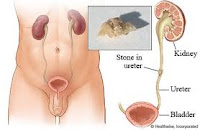A kidney stone is a hard, crystalline mineral material formed within the kidney or urinary tract. Kidney stones are formed when the urine becomes concentrated. Men are more tend to develop kidney stones than woman.
Types of kidney stones:
Calcium oxalate stones: These are very common kidney stones. Most of these patients have inheritated metabolic disorder that causes increased presense of calcium in the urine.
Eating of low calcium diets is associated with a higher risk for the development of kidney stones.
Calcium Phosphate stones:
Uric acid stones: Patients with gout often develop uric acid stones.
Cystine stones: These type of renal stones develop due to excessive amounts of amino acid cystine in the urine. Cystinuria is an inherited condition and is uncommon.
Causes:
- Family history of kidney stones may be more likely to develop stones.
- Urinary tract infections
- Dehydration
- Kidney disorders such as cystic kidney diseases
- Gout
- Hyperparathyroidism
- Hyperuricosuria
- Certain diuretics (water pills)
- Calcium-based antacids
Symptoms:
 |
| Symptom of Kidney Stones |
- Extreme pain while urinating which begins suddenly when a stone moves in the urinary tract and blocks the flow of urine.
- Sharp, cramping pain in the back and in the area of the kidney or in the lower abdomen. Later, pain may spread to the groin.
- Burning in urine
- Blood in urine
- Fever and chills
- Sometimes nausea and vomiting occur.
- Berberis vulgaris
- Lycopdium
- Pareira brava
- Terebinth
Prevention:
- Drink more 3 litres of water dailsy
- Avoid certain foods may promote stone formation in people who are susceptible
- People prone to forming calcium oxalate stones should avoid spinach, tomatoes (within limits), soyabean, peanuts, chocolates and sweet potatoes, cabbages, cauli flower, grapes and liver.
- Avoid taking vitamin D supplements
Note:




This comment has been removed by a blog administrator.
ReplyDelete